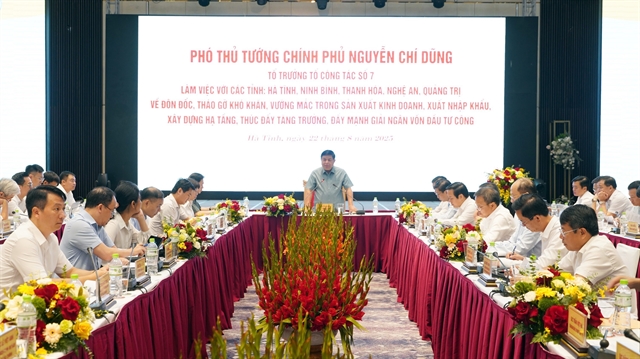 Politics & Law
Politics & Law


|
| Deputy Prime Minister Nguyễn Chí Dũng speaks at the working session on August 22 with five provinces of Ninh Bình, Thanh Hóa, Nghệ An, Hà Tĩnh and Quảng Trị. — VNA/VNS Photo |
HÀ TĨNH — Deputy Prime Minister Nguyễn Chí Dũng led a working delegation on Friday to five northern central provinces—Ninh Bình, Thanh Hóa, Nghệ An, Hà Tĩnh, and Quảng Trị—to review economic progress, tackle obstacles in production, business and trade, accelerate infrastructure development and promote public investment disbursement as part of a broader push to spur growth in these strategically important regions.
Following the Prime Minister’s establishment of eight task forces on July 16, each headed by senior government officials to remove barriers and foster development, Task Force No 7, under Deputy PM Dũng’s leadership, is charged with overseeing these five provinces.
This region holds significant potential in industrial development, tourism, high-tech agriculture, renewable energy, marine economy, and regional connectivity.
Deputy Finance Minister Nguyễn Thị Bích Ngọc presented a detailed report citing Official Dispatch No 11602/BTC-PTHT, dated July 30, which outlined the implementation of the State budget’s public investment plan over the first six months and the estimated seven months of 2025. The data showed that ministries, agencies, and localities under Task Force No.7 reached 49.52 per cent of their disbursement targets, exceeding the national average.
Notably, four provinces recorded disbursement rates above this average: Nghệ An achieved 75.83 per cent, Hà Tĩnh 60.52 per cent, Thanh Hóa 53.18 per cent, and Ninh Bình 49.78 per cent. However, Quảng Trị and several national scientific and social institutions remained below the average.
Economic performance in terms of GRDP for the first half of the year also showed robust growth, with Ninh Bình leading at 10.82 per cent, followed by Nghệ An (8.24 per cent), Hà Tĩnh (8.16 per cent), Thanh Hóa (7.88 per cent), and Quảng Trị (7.48 per cent). State budget revenue across these provinces reached 78.8 per cent of the annual target within seven months.
Despite these promising results, significant challenges persist. These include planning obstacles, slow land clearance, complex administrative procedures, weak inter-agency coordination, limited resources for project implementation, shortages and rising costs of construction materials, delays in major projects and sluggish progress in developing industrial parks, clusters and large-scale foreign direct investment ventures, all of which hinder investment attraction.
In his concluding remarks, Deputy PM Dũng urged the five provinces to maintain unity, enhance cooperation, embrace innovation, uphold accountability and respond promptly to legitimate concerns from businesses and citizens. He emphasised the critical role of new growth drivers such as science and technology, digital transformation, high-quality human resources, and maximising international integration.
Highlighting the importance of advancing digital, green, and circular economies alongside emerging industries like artificial intelligence, big data, cloud computing and cultural industries, he instructed localities to adjust provincial plans to optimise new development areas created by administrative reforms and regional zoning.
Deputy PM Dũng called for exploring economic corridors along North–South and East–West axes, developing tourism as a spearhead industry through national hubs and expanding industrial zones west of the North–South Expressway. He also stressed the need for smooth two-tier local governance, preparation for upcoming Party congresses and building a capable, ethical grassroots cadre system.
Other priorities include speeding up public investment disbursement, decentralising authority, advancing administrative reform and national digital transformation, promoting private investment, resolving long-standing projects and completing the elimination of temporary and dilapidated housing for revolution contributors and martyrs’ families by August 31.
The Deputy PM assigned the Ministry of Finance, in coordination with the Government Office, to compile reports for submission to him and the Prime Minister. Ministries and agencies were urged to urgently review local proposals and provide clear guidance with official responses due by August 30. — VNS




